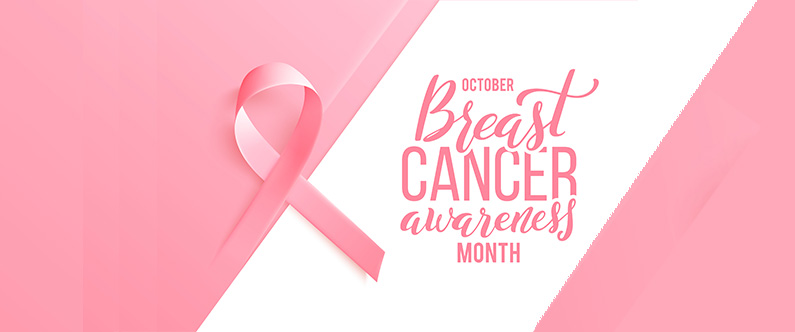Breast Cancer Awareness Month
 Health promotion and early detection; timely diagnosis; and comprehensive breast cancer management can help save millions of lives
Health promotion and early detection; timely diagnosis; and comprehensive breast cancer management can help save millions of lives
October 15, 2023
Authors: Dr. Amit Abraham, Dr. Sohaila Cheema, and Dr. Karima Chaabna
Breast Cancer Awareness Month, observed annually in October, is a campaign aimed at increasing awareness about breast cancer. This initiative focuses on fostering early detection, education, and support for those affected by the disease. Breast cancer is the most common form of cancer among women, both in Qatar and globally. During this month, individuals, health organizations, and communities highlight the importance of breast health; share information about breast cancer risk factors, prevention strategies, treatment options; and show support for individuals battling the disease.
Risk factors for breast cancer
Factors associated with an increased risk of breast cancer include: being female, being of advanced age, having a personal history of breast condition/s or breast cancer, having a family history of breast cancer, having been exposed to radiation, being obese, beginning menstruation at an age younger than 12, beginning menopause at an older age, undergoing postmenopausal hormone therapy, having never been pregnant or having the first child after 30 years, and consuming alcohol. Approximately 10% of all breast cancer cases are related to inherited damaged genes like BRCA1 and BRCA2. While some risk factors are not modifiable, others can be mitigated. Adopting a plant-based diet, quitting smoking, and reducing alcohol consumption can have a positive impact.
Signs and symptoms of breast cancer
These differ in individuals, and some may have no sign or symptom of breast cancer at all. Some warning signs/symptoms include:
- New lump in the breast or underarm (armpit).
- Thickening or swelling of any part of the breast.
- Irritation or dimpling of breast skin.
- Redness or flaky skin in the nipple area or the breast.
- Pulling in of the nipple or pain in the nipple area.
- Nipple discharge other than breast milk, including blood.
- Any change in the size or the shape of the breast.
- Pain in any area of the breast.
Reducing your risk of breast cancer
The following may help lower your risk of breast cancer:
- Regular self-examination: Conduct a breast self-examination regularly. This involves checking the breast tissue, moving from the breast to the armpits and around the collar bone area to identify any change, lump, or swelling. Early detection is crucial, so consult your doctor if you detect any new change or abnormality (review signs and symptoms section).
- Screening: ‘Screening’ refers to looking for early signs of cancer, ideally before developing symptoms. Detecting the cancer at an early stage will help in treatment or cure from cancer and can substantially improve the disease prognosis. Qatar’s Screen for Life Program offers free breast cancer screenings every three years for women aged 45 and above. A mammogram (i.e., low-dose X-ray) is used to detect breast cancer. Many individuals who develop breast cancer have no known risk factors, highlighting the importance of screening.
- Healthy diet and maintaining a healthy weight: The Mediterranean diet (rich in whole grains, plant-based foods, fruits, vegetable, legumes, nuts, fatty fish, and olive oil) can help reduce the risk of breast cancer. Maintaining a healthy weight is also important. If you are overweight or obese consult with a doctor to discuss healthy strategies to reduce weight.
- Exercise: Research has shown that regular physical activity can lower the risk of developing breast cancer. Try to do at least 30 minutes a day of moderate intensity activity, such as brisk walking, five times a week.

Show your support
- Wear pink: During Breast Cancer Awareness Month, join the movement by wearing pink ribbons, clothing, or accessories as a visible symbol of support. Encourage others to do the same and spark conversations about the importance of breast health.
- Share information: Utilize social media or your personal network to share breast cancer awareness messages, facts, and resources. Ensure that the information you share is sourced from reliable and reputable organizations such as the World Health Organization, the International Agency for Research on Cancer (IARC), or the Qatar Cancer Society.
- Donate or volunteer: Contribute to reputable breast cancer research organizations, advocacy groups, or support services. Whether through a monetary donation or volunteering your time and skills, your support can help fund research, raise awareness, and/or support those in need.
The World Health Organization’s Global Breast Cancer Initiative aims to reduce breast cancer by 2.5% annually, which will save 2.5 million lives over a period of 20 years. Health promotion and early detection; timely diagnosis; and comprehensive breast cancer management can help save millions of lives. Let’s advocate for these. Together, we can make a difference in the fight against breast cancer.
Sources: World Health Organization | International Agency for Research on Cancer (IARC) | Qatar's Screen for Life Program | Hamad Medical Corporation | Mayo Clinic | Johns Hopkins Medicine | Qatar Cancer Society
Editor: Julietta Mirghani